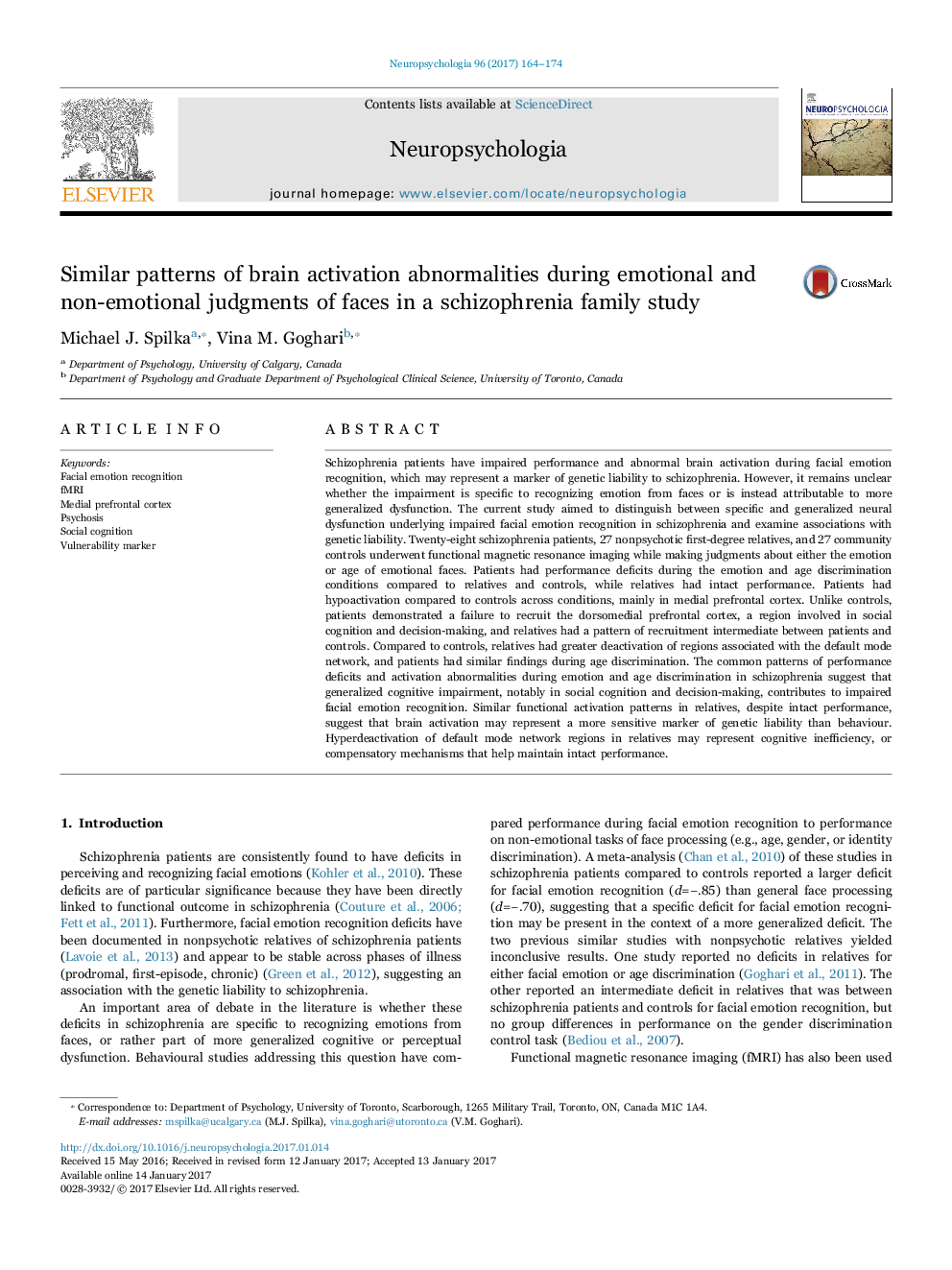ترجمه فارسی عنوان مقاله
الگوهای مشابه اختلالات فعال سازی مغز در قضاوت های عاطفی و غیر عاطفی چهره در یک مطالعه خانوادگی اسکیزوفرنی
عنوان انگلیسی
Similar patterns of brain activation abnormalities during emotional and non-emotional judgments of faces in a schizophrenia family study
| کد مقاله | سال انتشار | تعداد صفحات مقاله انگلیسی |
|---|---|---|
| 130097 | 2017 | 11 صفحه PDF |
منبع

Publisher : Elsevier - Science Direct (الزویر - ساینس دایرکت)
Journal : Neuropsychologia, Volume 96, February 2017, Pages 164-174
ترجمه چکیده
بیماران مبتلا به اسکیزوفرنی اختلال عملکرد و فعال سازی مغز غیر طبیعی در هنگام تشخیص احساسات صورت دارند که ممکن است نشان دهنده مسئولیت ژنتیکی اسکیزوفرنیا باشد. با این وجود هنوز معلوم نیست که آیا اختلال در تشخیص عاطفه از چهره خاص است یا اینکه به جای اختلال در تعاریف عمومی بیشتر است. مطالعه حاضر با هدف تعیین اختلال عملکرد عصبی خاص و عمومی در مبتلایان به اختلال در تشخیص احساسات صورت در اسکیزوفرنیا و بررسی ارتباط با مسئولیت ژنتیکی انجام شده است. بیست و هشت بیمار مبتلا به اسکیزوفرنیا، 27 بستری درجه یک غیر وابسته به روانپزشکی و 27 نفر از اعضای جامعه تحت بررسی تصویربرداری رزونانس مغناطیسی عملکردی قرار گرفتند و تصمیمات مربوط به احساس یا سن چهره های عاطفی را مورد بررسی قرار دادند. بیماران نقص عملکرد در طول شرایط تبعیض احساسات و سن نسبت به بستگان و کنترل داشتند، در حالی که بستگان عملکرد مطلوب داشتند. بیماران در مقایسه با کنترل در شرایط بیماری، نسبت به هیپوآیاکسیون، عمدتا در ناحیه قشر پیش فرناتال بودند. بر خلاف کنترل، بیماران نشان داد که شکستن استخوان کورتکس پیشانی فرسوده، منطقه ای است که در شناخت اجتماعی و تصمیم گیری مشارکت داشته است، و بستگان دارای الگوی استخدام میانجی بین بیماران و کنترل بودند. در مقایسه با کنترل ها، بستگان فعال تر از مناطق غیر مرتبط با شبکه حالت پیش فرض بود و بیماران یافته های مشابه در دوران تبعیض در سن. الگوهای رایج فقدان عملکرد و ناهنجاریهای فعال در حین تبعیض عاطفی و جنسی در اسکیزوفرنیا نشان می دهد که اختلالات شناختی عمومی، بویژه در شناخت اجتماعی و تصمیم گیری، باعث اختلال در شناخت احساسات صورت می شود. الگوهای عملکرد فعال مشابه در خویشاوندان، با وجود عملکرد نامنظم، نشان می دهد که فعال شدن مغز ممکن است نشانگر حساسیت ژنتیکی نسبت به رفتار باشد. غرق شدن در حالت پیش فرض حالت شبکه های شبکه در خویشاوندان ممکن است ناکارآمد شناختی یا مکانیسم های جبران کننده ای است که به حفظ عملکرد نامحدود کمک می کند.

